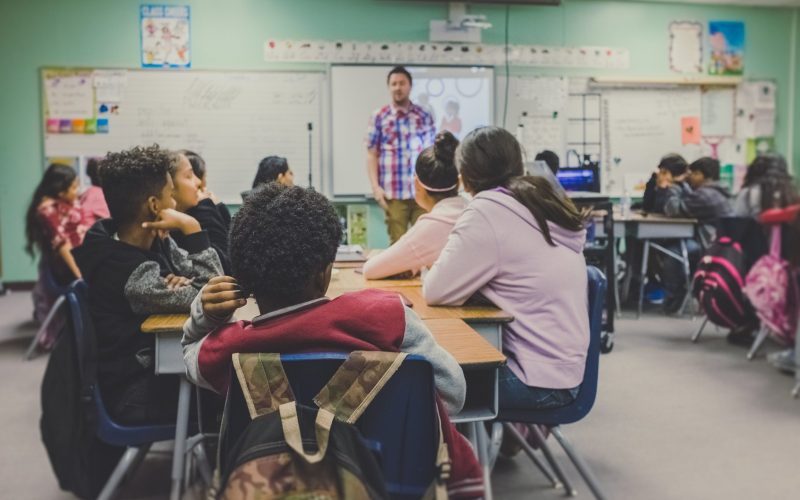Due to their close proximity to students, teachers and school personnel are often the first line of defense when it comes to identifying signs of child abuse and they are often blamed for failing to detect abuse sooner. Teachers are expected to act as detectives – to notice and question every bruise, every unwashed shirt, and to be skeptical of students who refuse to make eye contact. And, despite teaching packed classrooms and being woefully underpaid, teachers do a fantastic job of identifying and reporting abuse. But what happens when the person accused of abusing the child is the teacher?
Unfortunately, allegations of child abuse by teachers are not uncommon. In the 1980s, beloved elementary school teacher Richard Van Hook was accused after five (5) fifth graders came forward to report he had been sexually abusing them [1]. Children aged 10 to 16 continued to come forward as the investigation progressed, revealing that Van Hook led them into his “bear cave” during the lunch hour—a small office by the library with a hidden box of condoms, pillows, and a stack of pornographic magazines [2]. More recently, in 2019, Arizona teacher Brittany Zamora was convicted of sexual conduct with a minor for having sex with her 13 year-old student. It was also revealed during the investigation that Zamora had been engaging in explicit communication with the student over text and Instagram messaging. Zamora was sentenced to twenty (20) years in prison, lifetime probation upon release, and will have to register as a sex offender [3].
Arizona Guidelines for Student-Teacher Communication
In light of the Zamora case, the Arizona State Board of Education conducted a report on inappropriate communications, which found that the Board had taken 1,107 enforcement actions against teachers for “immoral or unprofessional conduct” between 2012 and 2021 [4]. The report also found that that 38% of the actions were associated with allegations of sexual misconduct [5].
Based on their report, the State Board published Guidelines, which advise teachers to use only school-approved technology when communicating with students and to only do so during school or extracurricular hours [6]. Although these Guidelines were approved by the Board, they are not mandated and there is no requirement that schools adopt any or all of the guidance. Additionally, the Board lacks the authority to investigate or discipline teachers who are uncertified, which make up around 40% of Arizona charter schools [7].
What if the allegation against the teacher is false?
While the crimes of Van Hook and Zamora are disturbing, teachers are not immune from false allegations of sexual misconduct. For example, California P.E. teacher John Fischler and Oregon tech-ed instructor Dan Domeniogi were each falsely accused of sexually assaulting their students [8]. Both pursued civil actions for damages against their students after they were cleared of wrongdoing, alleging that the accusations harmed their reputations.
Teachers and school personnel would be well advised to abide by the guidelines proposed by the State Board when communicating with students. While the most obvious advice is for teachers to refrain from engaging in any conduct that could be considered inappropriate with their students, even that would not eradicate the possibility of a teacher being accused of sexual misconduct. Teachers should be cautious when having private conversations with students, keeping a door open at all times, having a third-party witness if possible, and ensuring all conversations occur on school campus or at approved extracurricular activities.
If a teacher or other school personnel is accused of improper conduct with a student—be it sexual or otherwise—the best advice is to obtain legal counsel to help mitigate the damage and possibly prevent legal consequences. Counsel cannot “un-ring the bell” but they can take preventative measures to ensure any allegations are properly investigated and that false allegations are exposed.
[1] https://www.nytimes.com/1984/04/30/style/light-on-child-sex-abuse.html
[2] Id.
[3] https://www.azcentral.com/story/news/local/southwest-valley/2019/07/12/teacher-brittany-zamora-sentenced-molesting-student/1693827001/
[4] https://simbli.eboardsolutions.com/Meetings/Attachment.aspx?S=112020&AID=61952&MID=2495
[5] Id.
[6] https://www.yahoo.com/entertainment/no-personal-cellphones-arizona-board-131502626.html
[7] Id.
[8] https://www.huffpost.com/entry/john-fischler_n_4298237; https://www.latimes.com/archives/la-xpm-2000-apr-02-mn-15083-story.html
Sabra Barnett is a second-generation attorney with extensive criminal defense experience at the state and Federal levels. She is licensed to practice in Arizona and Alabama.
Isabel Ranney is a third-year law student at the Sandra Day O’Connor College of Law at Arizona State University, Associate Editor for the Law Journal for Social Justice, and clerk at Woodnick Law.



